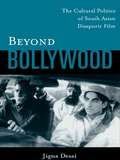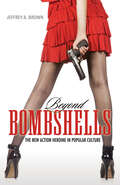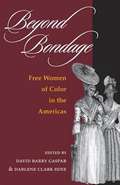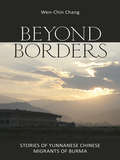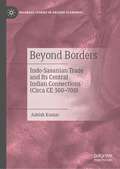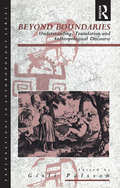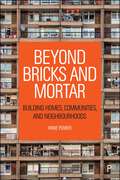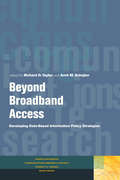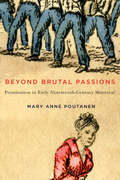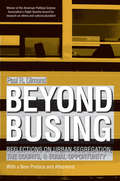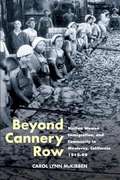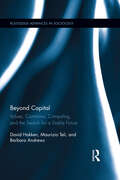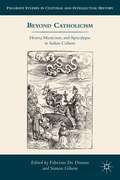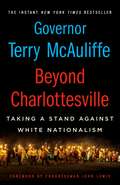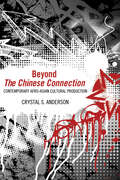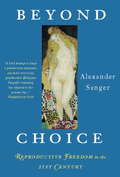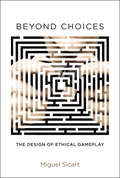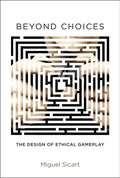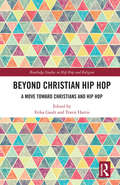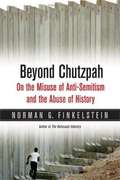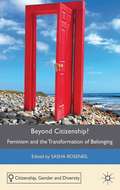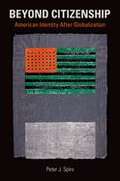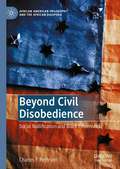- Table View
- List View
Beyond Bollywood: The Cultural Politics of South Asian Diasporic Film
by Jigna DesaiBeyond Bollywood is the first comprehensive look at the emergence, development, and significance of contemporary South Asian diasporic cinema. From a feminist and queer perspective, Jigna Desai explores the hybrid cinema of the "Brown Atlantic" through a close look at films in English from and about South Asian diasporas in the United States, Canada, and Britain, including such popular films as My Beautiful Laundrette, Fire, Monsoon Wedding, and Bend it Like Beckham.
Beyond Bombshells: The New Action Heroine in Popular Culture
by Jeffrey A. BrownBeyond Bombshells analyzes the cultural importance of strong women in a variety of current media forms. Action heroines are now more popular in movies, comic books, television, and literature than they have ever been. Their spectacular presence represents shifting ideas about female agency, power, and sexuality. Beyond Bombshells explores how action heroines reveal and reconfigure perceptions about how and why women are capable of physically dominating roles in modern fiction, indicating the various strategies used to contain and/or exploit female violence. Focusing on a range of successful and controversial recent heroines in the mass media, including Katniss Everdeen from The Hunger Games books and movies, Lisbeth Salander from The Girl with the Dragon Tattoo novels and films, and Hit-Girl from the Kick-Ass movies and comic books, Jeffrey A. Brown argues that the role of action heroine reveals evolving beliefs about femininity. While women in action roles are still heavily sexualized and objectified, they also challenge preconceived myths about normal or culturally appropriate gender behavior. The ascribed sexuality of modern heroines remains Brown's consistent theme, particularly how objectification intersects with issues of racial stereotyping, romantic fantasies, images of violent adolescent and preadolescent girls, and neoliberal feminist revolutionary parables. Individual chapters study the gendered dynamics of torture in action films, the role of women in partnerships with male colleagues, young women as well as revolutionary leaders in dystopic societies, adolescent sexuality and romance in action narratives, the historical import of nonwhite heroines, and how modern African American, Asian, and Latina heroines both challenge and are restricted by longstanding racial stereotypes.
Beyond Bondage: FREE WOMEN OF COLOR IN THE AMERICAS
by David Barry Gaspar Darlene Clark HineDavid Barry Gaspar and Darlene Clark Hine's Beyond Bondage outlines the restricted spheres within which free women of color, by virtue of gender and racial restrictions, were forced to carve out their existences. Although their freedom, represented by the acquisition of property, respectability, and opportunity, always remained precarious, the collection supports the surprising conclusion that women of color often sought and obtained these advantages more successfully than their male counterparts.
Beyond Borders: Stories of Yunnanese Chinese Migrants of Burma
by Wen-Chin ChangThe Yunnanese from southwestern China have for millennia traded throughout upland Southeast Asia. Burma in particular has served as a "back door" to Yunnan, providing a sanctuary for political refugees and economic opportunities for trade explorers. Since the Chinese Communist takeover in 1949 and subsequent political upheavals in China, an unprecedented number of Yunnanese refugees have fled to Burma. Through a personal narrative approach, Beyond Borders is the first ethnography to focus on the migration history and transnational trading experiences of contemporary Yunnanese Chinese migrants (composed of both Yunnanese Han and Muslims) who reside in Burma and those who have moved from Burma and resettled in Thailand, Taiwan, and China. Since the 1960s, Yunnanese Chinese migrants of Burma have dominated the transnational trade in opium, jade, and daily consumption goods. Wen-Chin Chang writes with deep knowledge of this trade's organization from the 1960s of mule-driven caravans to the use of modern transportation, and she reconstructs trading routes while examining embedded sociocultural meanings. These Yunnanese migrants' mobility attests to the prevalence of travel not only by the privileged but also by different kinds of people. Their narratives disclose individual life processes as well as networks of connections, modes of transportation, and differences between the experiences of men and women. Through traveling they have carried on the mobile livelihoods of their predecessors, expanding overland trade beyond its historical borderlands between Yunnan and upland Southeast Asia to journeys further afield by land, sea, and air.
Beyond Borders: Indo-Sasanian Trade and Its Central Indian Connections (Circa CE 300–700) (Palgrave Studies in Ancient Economies)
by Ashish KumarThis book examines the economic history of ancient South Asia by situating the Malwa region of Central India within Afro-Eurasian trade networks to illuminate the role of traders in the political, religious and economic processes connected with the Indo-Sasanian trade in the period of five centuries, circa CE 300-700.The book challenges the long-held centrality of the Roman factor in the South Asian economy by locating the Indo-Sasanian interactions in long distance economic networks with trade as a central feature. It considers the role and influence of traders as an understudied group affecting the contribution of the Indian economy to the world system. Amidst rapidly changing political landscapes, traders of Indian and Sasanian origins are studied as conscious political beings, who formed ties with varieties of polities and religious communities to secure their commercial interests. In addition, their commercial interactions with their Sogdian (Central Asia) and Aksumite (East Africa) counterparts are analyzed. The book also considers the nature of trade routes and the specific connections between mercantile and religious networks, including patterns of construction of religious shrines and temples along trade routes. Integrating epigraphic, numismatic, literary and archaeological evidence, this book moves away from a marginal treatment of the Indo-Sasanian trade in Indian history, and demonstrates how regional economic history must address a plurality of causes, actors, and processes in its assessment of the regional economy. The book will be of interest to students and academics of Indian economic history, as well as the ancient economies of South Asia more broadly.
Beyond Boundaries: Understanding, Translation and Anthropological Discourse
by Gísli PálssonAnthropology, it is often argued, is an art of translation. Recently, however, social theorists have raised serious doubts about the translator's enterprise. Over the last few years the human social and ecological habitat has seen spectacular developments. Modern humans inhabit a 'global village' in a very genuine sense. What lessons may be learned from these developments for anthropology? In Beyond Boundaries, ten anthropologists from different countries address the problem of social understanding and cultural translation from different theoretical as well as ethnographic perspectives. Quite appropriately, given the general theme of the volume, the contributors represent several different academic traditions and communities - Britain, Finland, France, Iceland, Israel, Japan, Norway, the former Soviet Union, and Sweden.
Beyond Bricks and Mortar: Building Homes, Communities, and Neighbourhoods (CASE Studies on Poverty, Place and Policy)
by null Anne PowerSocial housing continues to decline as existing tenanted homes are sold to their occupiers and run-down council estates are demolished. Demonstrating the value of the ‘Housing Plus’ approach –investment beyond “bricks and mortar” – this book outlines the role social landlords can play in tackling community problems. By investing in estate renewal, helping to house the vulnerable, offering a wide range of tenures and encouraging community housing, this approach builds links between housing design and a wider social value agenda. With the voices of tenants and frontline staff at the forefront, Anne Power demonstrates how policy and practice can shift the bias against social housing in favour of its re-expansion.
Beyond Broadband Access: Developing Data-Based Information Policy Strategies (Donald McGannon Communication Research Center's Everett C. Parker Book Series)
by Richard D. Taylor Amit M. SchejterAfter broadband access, what next? What role do metrics play in understanding “information societies”? And, more important, in shaping their policies? Beyond counting people with broadband access, how can economic and social metrics inform broadband policies, help evaluate their outcomes, and create useful models for achieving national goals? This timely volume not only examines the traditional questions about broadband, like availability and access, but also explores and evaluates new metrics more applicable to the evolving technologies of information access.Beyond Broadband Access brings together a stellar array of media policy scholars from a wide range of disciplines—economics, law, policy studies, computer science, information science, and communications studies. Importantly, it provides a well-rounded, international perspective on theoretical approaches to databased communications policymaking in the Americas, Europe, Asia, and Africa. Showcasing a diversity of approaches, this invaluable collection helps to meet myriad challenges to improving the foundations for communications policy development.
Beyond Brutal Passions: Prostitution in Early Nineteenth-Century Montreal (Studies on the History of Quebec/Études d'histoire du Québec #30)
by Mary Anne PoutanenDuring a time of significant demographic, geographic, and social transition, many women in early nineteenth-century Montreal turned to prostitution and brothel-keeping to feed, clothe, protect, and house themselves and their families. Beyond Brutal Passions is a close study of the women who were accused of marketing sex, their economic and social susceptibilities, and the strategies they employed to resist authority and assert their own agency. Referencing newspapers, parish registers, census returns, coroners' reports, city directories, documents of Catholic and Protestant institutions, police books, and court records, Mary Anne Poutanen reveals how these women confronted limited alternatives and how they fought against established authority in the pursuit of their livelihoods. She details these women’s lives not only as prostitutes but also as wives, mothers, sisters, and daughters who reconstructed the bonds of kinship and solidarity. An insightful history of prostitution, Beyond Brutal Passions explores the complicated relationships between women accused of prostitution and the society in which they lived and worked.
Beyond Buds
by Ed Rosenthal David DownsBeyond Buds is a handbook to the future of marijuana. Prohibition's end has led to a technological revolution that's generated powerful medicines and products containing almost zero carcinogens and little smoke. Marijuana icon Ed Rosenthal and leading cannabis reporter David Downs guide readers through the best new consumer products, and demonstrate how to make and use the safest, cleanest extracts. Beyond Buds details how award-winning artisans make hash and concentrates, and includes modern techniques utilizing dry ice and CO2. The book is a primer on making kief, water hash, tinctures, topicals, edibles, and other extracts from cannabis leaves, trim, and bud bits, and it goes on to explore and simplify the more exotic and trendy marijuana-infused products, such as butane hash oil (BHO), shatter, wax, and budder. More complex than lighting a joint, these innovative products call for new accessories - special pipes, dabbing tools, and vaporizers - all of which are reviewed and pictured in the book. Beyond Buds expands on Rosenthal's previous book Ask Ed: Marijuana Gold - Trash to Stash. Completely updated with full-color photographs that are both "how-to" guides and eye candy, this book enables not only the health-conscious toker but also the bottom line-driven cultivator.
Beyond Busing: Reflections on Urban Segregation, the Courts, and Equal Opportunity
by Paul R. DimondA compelling insider's account of the fight for educational desegregation, from one of its most dedicated and outspoken heroes. A new afterword explains the author's controversial belief that the moment for litigating educational equality has passed, clear-sightedly critiquing his own courtroom strategies and the courts' responses, before closing with an assessment of the economic and social changes that he feels have already moved us "beyond busing. " "An extraordinarily informative and thoughtful book describing the process of bringing Brown [v. Board of Education] North and the impact this process had upon national attitudes toward desegregation. " --Drew S. Days III, Yale Law Journal "An original analysis of a tough subject. A must-read for all who care about opportunity for all our children. " --Donna E. Shalala, President, University of Miami "Paul Dimond remains a passionate and caring voice for inner-city students, whether in his advocacy of school desegregation, school choice plans, or school finance reform. He illuminates these issues as one who participated in the major education cases and as a perceptive scholar. " --Mark Yudof, Chancellor, The University of Texas System "A must-read for anyone who wants to understand America's continued failure to give inner-city children a quality education or to do something about it!" --Sheryll Cashin, Author of The Failures of Integration: How Race and Class Are Undermining the American Dream "Dimond is particularly good at relating his slice of legal history to the broader developments of the 1970s, and his occasional remarks about trial tactics are amusing and instructive. Dimond's honesty about both his successes and failures makes his book required reading for civil rights lawyers. " --Lawrence T. Gresser, Michigan Law Review "A fascinating first-hand account of 1970s northern school desegregation decisions. " --Neal E. Devins, American Bar Foundation Research Journal "Dimond reminds the liberal reader of the promise that lies in the empowerment of ordinary families to choose their own schools. " --John E. Coons, Professor of Law, Emeritus, University of California, Berkeley Paul R. Dimond is counsel to Miller, Canfield, Paddock and Stone, Michigan's largest law firm; chairman of McKinley, a national commercial real estate investment and management firm; and chairman or member of the board of trustees of numerous education, community, and civic organizations. He spent four years as President Clinton's Special Assistant for Economic Policy.
Beyond Cannery Row: Sicilian Women, Immigration, and Community in Monterey, California, 1915-99
by Carol Lynn MckibbenPresenting a nuanced story of women, migration, community, industry, and civic life at the turn of the twentieth century, Carol Lynn McKibben's Beyond Cannery Row analyzes the processes of migration and settlement of Sicilian fishers from three villages in Western Sicily to Monterey, California--and sometimes back again. McKibben's analysis of gender and gender roles shows that it was the women in this community who had the insight, the power, and the purpose to respond and even prosper amid changing economic conditions. Vividly evoking the immigrants' everyday experiences through first-person accounts and detailed description, McKibben demonstrates that the cannery work done by Sicilian immigrant women was crucial in terms of the identity formation and community development. These changes allowed their families to survive the challenges of political conflicts over citizenship in World War II and intermarriage with outsiders throughout the migration experience. The women formed voluntary associations and celebrated festas that effectively linked them with each other and with their home villages in Sicily. Continuous migration created a strong sense of transnationalism among Sicilians in Monterey, which has enabled them to continue as a viable ethnic community today.
Beyond Capital: Values, Commons, Computing, and the Search for a Viable Future (Routledge Advances in Sociology #168)
by Barbara Andrews David Hakken Maurizio TeliThe financial/social cataclysm beginning in 2007 ended notions of a “great moderation” and the view that capitalism had overcome its systemic tendencies to crisis. The subsequent failure of contemporary social formations to address the causes of the crisis gives renewed impetus to better analysis in aid of the search for a better future. This book contributes to this search by reviving a broad discussion of what we humans might want a post-capitalist future to be like. It argues for a comparative anthropological critique of capital notions of value, thereby initiating the search for a new set of values, as well as identifying a number of selected computing practices that might evoke new values. It articulates a suggestive set of institutions that could support these new values, and formulates a group of measurement practices usable for evaluating the proposed institutions. The book is grounded in contemporary social science, political theory, and critical theory. It aims to leverage the possibility of alternative futures implied by some computing practices while avoiding hype and technological determinism, and uses these computing practices to explicate one possible way to think about the future.
Beyond Caring Labour to Provisioning Work
by Stephanie Baker-Collins Sheila Neysmith Elaine Porter Marge Reitsma-StreetAlthough women have long been members of the labour force, the proportion of domestic, caring, and community work they provide compared to men or the state has yet to decrease substantially. Beyond Caring Labour to Provisioning Work offers a powerful new framework for understanding women's work in a holistic sense, acknowledging both their responsibilities in supporting others as well as their employment duties.Beyond Caring Labour to Provisioning Work is based on a four-year, multi-site study of women who are members of contemporary community organizations. The authors reveal the complex ways in which these women define and value their own work, investigating what supports and constrains their individual and collective efforts. Calling on the state to assist more with citizens' provisioning responsibilities, Beyond Caring Labour to Provisioning Work provides an excellent basis for new discussions on equitable and sustainable public policies.
Beyond Catholicism
by Fabrizio De Donno Simon GilsonThe essays within Beyond Catholicism trace the interconnections of belief, heresy, and mysticism in Italian culture from the Middle Ages to today. In particular, they explore how religious discourse has unfolded within Italian culture in the context of shifting paradigms of rationality, authority, time, good and evil, and human collectivities.
Beyond Charlottesville: Taking a Stand Against White Nationalism
by Terry McAuliffeThe former governor of Virginia tells the behind-the-scenes story of the violent “Unite the Right” rally in Charlottesville—and shows how we can prevent other Charlottesvilles from happening. <P><P>When Governor Terry McAuliffe hung up the phone on the afternoon of the violent “Unite the Right” rally in Charlottesville, he was sure Donald Trump would do the right thing as president: condemn the white supremacists who’d descended on the college town and who’d caused McAuliffe to declare a state of emergency that morning. He didn’t. Instead Trump declared there was “hatred, bigotry and violence on many sides.” <P><P>Trump was condemned from many sides himself, even by many Republicans, but the damage was done. He’d excused and thus egged on the terrorists at the moment when he could have stopped them in their tracks. <P><P>In Beyond Charlottesville, McAuliffe looks at the forces and events that led to the tragedy in Charlottesville, including the vicious murder of Heather Heyer and the death of two state troopers in a helicopter accident. He doesn’t whitewash Virginia history and discusses a KKK protest over the removal of a statue of Robert E. Lee. He takes a hard real-time behind-the-scenes look at the actions of everyone on that fateful August 12, including himself, to see what could have been done. He lays out what was done afterwards to prevent future Charlottesvilles—and what still needs to be done as America in general and Virginia in particular continue to grapple with their history of racism. <P><P>Beyond Charlottesville will be the definitive account of an infamous chapter in our history, seared indelibly into memory, sure to be cited for years as a crucial reference point in the long struggle to fight racism, extremism and hate. <P><P><b>A New York Times Bestseller</b>
Beyond The Chinese Connection: Contemporary Afro-Asian Cultural Production
by Crystal S. AndersonIn Beyond “The Chinese Connection,” Crystal S. Anderson explores the cultural and political exchanges between African Americans, Asian Americans, and Asians over the last four decades. To do so, Anderson examines such cultural productions as novels (Frank Chin’s Gunga Din Highway [1999], Ishmael Reed’s Japanese by Spring [1992], and Paul Beatty’s The White Boy Shuffle [1996]); films (Rush Hour 2 [2001], Unleashed [2005], and The Matrix trilogy [1999-2003]); and Japanese animation (Samurai Champloo [2004]), all of which feature cross-cultural conversations. In exploring the ways in which writers and artists use this transferal, Anderson traces and tests the limits of how Afro-Asian cultural production interrogates conceptions of race, ethnic identity, politics, and transnational exchange. Ultimately, this book reads contemporary black/Asian cultural fusions through the recurrent themes established by the films of Bruce Lee, which were among the first—and certainly most popular—works to use this exchange explicitly. As a result of such films as Enter the Dragon (1973), The Chinese Connection (1972), and The Big Boss (1971), Lee emerges as both a cross-cultural hero and global cultural icon who resonates with the experiences of African American, Asian American and Asian youth in the 1970s. Lee’s films and iconic imagery prefigure themes that reflect cross-cultural negotiations with global culture in post-1990 Afro-Asian cultural production.
Beyond Choice: Reproductive Freedom In The 21st Century
by Alexander SangerThirty years after Roe v. Wade, the argument between "pro-choicers" and "pro-lifers" has reached stalemate. Pro-choice arguments haven't persuaded a comfortable majority that legal abortion is vital to our society, nor addressed our moral qualms. Younger people are less and less supportive of reproductive rights. Since 1996, state legislatures have enacted nearly 300 pieces of anti-choice legislation. With Roe in jeopardy, International Planned Parenthood Council Chair Alexander Sanger asks a simple but heretical question: How many more pieces of anti-choice legislation will it take to get the pro-choice movement to rethink its approach to the issue? In Beyond Choice Sanger explores the history of the reproductive rights movement to discover how it got stuck in its thinking, and then provides a convincing new argument for the moral rightness of its cause. He shows why it is vital to the health and survival of the human race that couples be able to have children, or not, when they choose; why reproductive rights are just as important to men as to women; and why, in an era of new reproductive technologies, completely unfettered choice is not morally defensible. Beyond Choice is inspiring and important reading for women's rights advocates, opinion leaders, medical ethicists, and anyone concerned to preserve our freedom to reproduce, or not, without government intervention.
Beyond Choices: The Design of Ethical Gameplay (The\mit Press Ser.)
by Miguel SicartHow computer games can be designed to create ethically relevant experiences for players.Today's blockbuster video games—and their never-ending sequels, sagas, and reboots—provide plenty of excitement in high-resolution but for the most part fail to engage a player's moral imagination. In Beyond Choices, Miguel Sicart calls for a new generation of video and computer games that are ethically relevant by design. In the 1970s, mainstream films—including The Godfather, Apocalypse Now, Raging Bull, and Taxi Driver—filled theaters but also treated their audiences as thinking beings. Why can't mainstream video games have the same moral and aesthetic impact? Sicart argues that it is time for games to claim their place in the cultural landscape as vehicles for ethical reflection.Sicart looks at games in many manifestations: toys, analog games, computer and video games, interactive fictions, commercial entertainments, and independent releases. Drawing on philosophy, design theory, literary studies, aesthetics, and interviews with game developers, Sicart provides a systematic account of how games can be designed to challenge and enrich our moral lives. After discussing such topics as definition of ethical gameplay and the structure of the game as a designed object, Sicart offers a theory of the design of ethical game play. He also analyzes the ethical aspects of game play in a number of current games, including Spec Ops: The Line, Beautiful Escape: Dungeoneer, Fallout New Vegas, and Anna Anthropy's Dys4Ia. Games are designed to evoke specific emotions; games that engage players ethically, Sicart argues, enable us to explore and express our values through play.
Beyond Choices
by Miguel SicartToday's blockbuster video games -- and their never-ending sequels, sagas, and reboots -- provide plenty of excitement in high-resolution but for the most part fail to engage a player's moral imagination. In Beyond Choices, Miguel Sicart calls for a new generation of video and computer games that are ethically relevant by design. In the 1970s, mainstream films -- including The Godfather, Apocalypse Now, Raging Bull, and Taxi Driver -- filled theaters but also treated their audiences as thinking beings. Why can't mainstream video games have the same moral and aesthetic impact? Sicart argues that it is time for games to claim their place in the cultural landscape as vehicles for ethical reflection.Sicart looks at games in many manifestations: toys, analog games, computer and video games, interactive fictions, commercial entertainments, and independent releases. Drawing on philosophy, design theory, literary studies, aesthetics, and interviews with game developers, Sicart provides a systematic account of how games can be designed to challenge and enrich our moral lives. After discussing such topics as definition of ethical gameplay and the structure of the game as a designed object, Sicart offers a theory of the design of ethical game play. He also analyzes the ethical aspects of game play in a number of current games, including Spec Ops: The Line, Beautiful Escape: Dungeoneer, Fallout New Vegas, and Anna Anthropy's Dys4Ia. Games are designed to evoke specific emotions; games that engage players ethically, Sicart argues, enable us to explore and express our values through play.
Beyond Christian Hip Hop: A Move Towards Christians and Hip Hop (Routledge Studies in Hip Hop and Religion)
by Erika D. Gault Travis HarrisChristians and Christianity have been central to Hip Hop since its inception. This book explores the intersection of Christians and Hip Hop and the multiple outcomes of this intersection. It lays out the ways in which Christians and Hip Hop overlap and diverge. The intersection of Christians and Hip Hop brings together African diasporic cultures, lives, memories and worldviews. Moving beyond the focus on rappers and so-called "Christian Hip Hop," each chapter explores three major themes of the book: identifying Hip Hop, irreconcilable Christianity, and boundaries.There is a self-identified Christian Hip Hop (CHH) community that has received some scholarly attention. At the same time, scholars have analyzed Christianity and Hip Hop without focusing on the self-identified community. This book brings these various conversations together and show, through these three themes, the complexities of the intersection of Christians and Hip Hop. Hip Hop is more than rap music, it is an African diasporic phenomenon. These three themes elucidate the many characteristics of the intersection between Christians and Hip Hop and our reasoning for going beyond "Christian Hip Hop." This collection is a multi-faceted view of how religious belief plays a role in Hip Hoppas' lives and community. It will, therefore, be of great interest to scholars of Religion and Hip Hop, Hip Hop, African Diasporas, Religion and the Arts, Religion and Race and Black Theology as well as Religious Studies more generally.
Beyond Chutzpah: On the Misuse of Anti-Semitism and the Abuse of History
by Norman G. FinkelsteinIn this sequel to his international bestseller "The Holocaust Industry", Norman G. Finkelstein moves from an iconoclastic interrogation of the new anti-Semitism to a meticulously researched expose of the corruption of scholarship on the Israel-Palestine conflict.
Beyond Citizenship?
by Sasha RoseneilBeyond Citizenship? Feminism and the Transformation of Belonging pushes debates about citizenship and feminist politics in new directions, challenging us to think 'beyond citizenship', and to engage in feminist re-theorizations of the experience and politics of belonging.
Beyond Citizenship: American Identity After Globalization
by Peter J. SpiroAmerican identity has always been capacious as a concept but narrow in its application. Citizenship has mostly been about being here, either through birth or residence. The territorial premises for citizenship have worked to resolve the peculiar challenges of American identity. But globalization is detaching identity from location. What used to define American was rooted in American space. Now one can be anywhere and be an American, politically or culturally. <p><p> Against that backdrop, it becomes difficult to draw the boundaries of human community in a meaningful way. Longstanding notions of democratic citizenship are becoming obsolete, even as we cling to them. This book charts the trajectory of American citizenship and shows how American identity is unsustainable in the face of globalization. The author describes how citizenship law once reflected and shaped the American national character. He explores the histories of birthright citizenship, naturalization, dual citizenship, and how those legal regimes helped reinforce an otherwise fragile national identity. But on a shifting global landscape, citizenship status has become increasingly divorced from any sense of actual community on the ground. <p><p> As the bonds of citizenship dissipate, membership in the nation-state becomes less meaningful. The rights and obligations distinctive to citizenship are now trivial. Naturalization requirements have been relaxed, dual citizenship embraced, and territorial birthright citizenship entrenched―developments that are all irreversible. Loyalties, meanwhile, are moving to transnational communities defined in many different ways: by race, ethnicity, gender, religion, age, and sexual orientation. These communities, the author boldly argues, are replacing bonds that once connected people to the nation-state, with profound implications for the future of governance.
Beyond Civil Disobedience: Social Nullification and Black Citizenship (African American Philosophy and the African Diaspora)
by Charles F. PetersonThis book interrogates the nature and state of African American citizenship through the prism of Social Contract Theory. Challenging the United States’ commitment to African American citizenship, this book explores the idea of Social Nullification, the decision to reject, revoke and re-define the social contract with a state and society. Charles F. Peterson surveys the history of Social Contract Theory, examines Nullification as political and legal theory, argues public policy as a measure of the state’s commitment to the contractarian relationship and frames the writings and activism of Martin R. Delany, Ida B. Wells-Barnett and the African American Reparations Movement as examples of Social Nullification and challenges to the terms of Black life in America.
